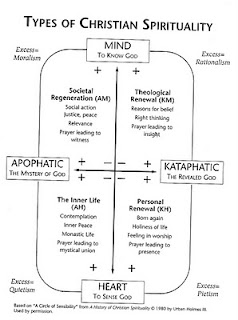Love Is Who You Are...
The mysticism of Rohr's thoughts often baffle me, comfort me while challenging me. I don't want to lose today's thoughts as I think there is a lot to chew over so as ever I park it here to revist.
"Your True Self is who you are, and always have been in God; and at its core, it is love itself. Love is both who you are and who you are still becoming, like a sunflower seed that becomes its own sunflower. Most of human history has referred to the True Self as your "soul" or "your participation in the eternal life of God." The great surprise and irony is that "you," or who you think you are, have nothing to do with your True Self's original creation or its ongoing existence. This is disempowering and utterly empowering at the same time. There's nothing you can do to make God love you more; and there's nothing you can do to make God love you less. All you can do is nurture your True Self, which is saying quite a lot. It is love becoming love in this unique form called "me."
According to St. Paul (Romans 8:28), becoming my True Self seems to be a fully cooperative effort, affirmed in my own limited experience. God never forces himself/herself on us or coerces us toward life or love by any threats whatsoever. God seduces us, yes; coerces us, no (Jeremiah 20:7; Matthew 11:28-30). Whoever this God is, he or she is utterly free and utterly respects our own human freedom. Love cannot happen in any other way. Love flourishes inside freedom and then increases that freedom even more. "For freedom Christ has set us free!" shouts St. Paul in his critique of all legalistic religion (Galatians 5:1).
We are allowed to ride life's and love's wonderful mystery for a few years--until life and love reveal themselves as the same thing, which is the final and full message of the Risen Christ--life morphing into a love that is beyond space and time. He literally "breathes" shalom and forgiveness into the universal air (John 20:22-23). We get to add our own finishing touches of love, our own life breath to the Great Breath, and then return the completed package to its maker in a brand-new but also same form. It is indeed the same "I," but now it is in willing union with the great "I AM" (Exodus 3:14). It is no longer just one, but not two either"
(Richard Rohr accessed Thursday, January 7, 2016)
"Your True Self is who you are, and always have been in God; and at its core, it is love itself. Love is both who you are and who you are still becoming, like a sunflower seed that becomes its own sunflower. Most of human history has referred to the True Self as your "soul" or "your participation in the eternal life of God." The great surprise and irony is that "you," or who you think you are, have nothing to do with your True Self's original creation or its ongoing existence. This is disempowering and utterly empowering at the same time. There's nothing you can do to make God love you more; and there's nothing you can do to make God love you less. All you can do is nurture your True Self, which is saying quite a lot. It is love becoming love in this unique form called "me."
According to St. Paul (Romans 8:28), becoming my True Self seems to be a fully cooperative effort, affirmed in my own limited experience. God never forces himself/herself on us or coerces us toward life or love by any threats whatsoever. God seduces us, yes; coerces us, no (Jeremiah 20:7; Matthew 11:28-30). Whoever this God is, he or she is utterly free and utterly respects our own human freedom. Love cannot happen in any other way. Love flourishes inside freedom and then increases that freedom even more. "For freedom Christ has set us free!" shouts St. Paul in his critique of all legalistic religion (Galatians 5:1).
We are allowed to ride life's and love's wonderful mystery for a few years--until life and love reveal themselves as the same thing, which is the final and full message of the Risen Christ--life morphing into a love that is beyond space and time. He literally "breathes" shalom and forgiveness into the universal air (John 20:22-23). We get to add our own finishing touches of love, our own life breath to the Great Breath, and then return the completed package to its maker in a brand-new but also same form. It is indeed the same "I," but now it is in willing union with the great "I AM" (Exodus 3:14). It is no longer just one, but not two either"
(Richard Rohr accessed Thursday, January 7, 2016)

Comments